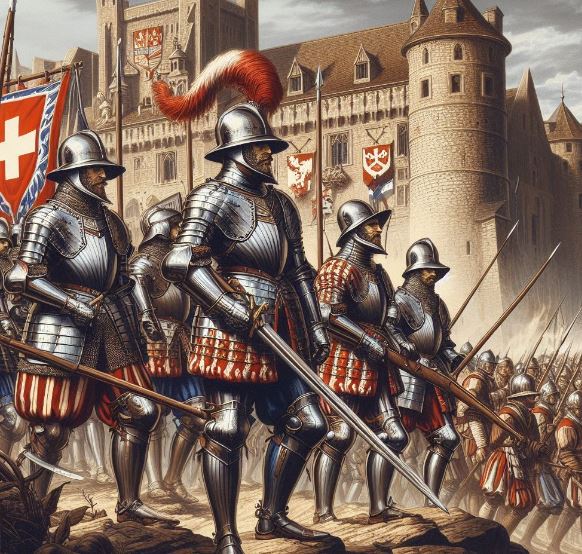Switzerland, a small country with a population of 8.7 million as of 2022, is one of the few wealthy nations in the world with a per capita income exceeding $100,000. However, medieval Switzerland was a poor country with limited options due to its rugged mountainous terrain; livestock farming was about the only viable occupation. The people of this impoverished nation created a new industry centered around a risky profession: being mercenaries. They referred to themselves as Reisläufer, which means ‘those who go to war.’

In medieval Europe, there was a profession known as the free company. A free company (French: grande companie) was a group of mercenaries who entered into employment contracts during wars. The term ‘free’ implied that they were not affiliated with any national government and were essentially outlaws. Although they were most rampant in France, they were also prevalent in Italy and the Holy Roman Empire. However, they generally lacked discipline and were notorious for poorly fighting and readily betraying their employers when defeat loomed.
In this market, Switzerland began to provide mercenary services based on trust. Starting from the early 1500s, Swiss mercenaries were famous for adhering to their contracts with employers even unto death. The country cultivated and managed professional soldiers, fostering reliability. Most mercenaries had homes and families to support back in their homeland, making their reputation and credit crucial. For example, during the 1527 Sack of Rome, when Charles V of Burgundy, the future ruler of the Netherlands, invaded Rome, it was these Swiss mercenaries who staunchly defended Pope Clement VII until the end. They also defended the French Bourbon monarchy during the French Revolution. With reliable service and a solid track record, Swiss mercenaries became the preferred ‘brand’ for neighboring kingdoms in France and Italy. From a national competitiveness perspective, Switzerland thus came to possess a distinct industry: the mercenary trade.
Switzerland, contrary to its beautiful natural scenery, has a tumultuous history marked by constant foreign incursions. It is surrounded perfectly by Germany, Austria, Italy, and France. The country is multilingual, speaking German, French, Italian, and Romansh, and has historically been part of the Roman Empire, the Frankish Empire, the Holy Roman Empire, and was under the rule of the Austrian House of Habsburg.

The direct ancestors of the Swiss, a Celtic tribe known as the Helvetii, began settling in what is now Switzerland around the 15th century BC. Due to its strategic location, invasions by other groups were a common occurrence. Early on, in 58 BC, it was absorbed into the Roman Empire and remained under Roman rule until around the year 400. In the 6th century, it was absorbed into the Frankish Empire, and from the 9th to the 12th century, it was under the rule of the Holy Roman Empire. After escaping the rule of the Holy Roman Empire, it came under the governance of the Habsburg dynasty.
Switzerland gained independence from the Holy Roman Empire in 1648 following the Thirty Years’ War with the Peace of Westphalia and confirmed its independence during the reorganization of Europe after the Napoleonic Wars, also gaining recognition as a permanently neutral country. This permanent neutrality was Switzerland’s second strategic differentiation and proved to be a masterstroke.
Thus, Switzerland managed to avoid the ravages of World War II and played a central role as the Swiss franc served as a key currency in Europe. Although the U.S. and the U.K. also had key currencies at the time, these countries were involved in the war, which meant their currencies could potentially become worthless depending on the outcome of the war. The primary reason Switzerland was not engulfed in World War II was that its currency was used as a means of payment by warring nations, serving as a key currency, ultimately due to its strategy of permanent neutrality. Once again, Switzerland’s strategy of differentiation proved to be a vital survival strategy.
Today, most wars occur in markets, and the weapon is marketing. Marketing could be described as a concept involving various strategies and techniques, but if asked to define it in one word, it would be ‘differentiation.’ Such differentiation exists in natural ecosystems and remains a fundamental and essential strategy for both companies and nations. This strategy helps businesses achieve sustainable growth and adapt to changing market conditions. Differentiation is not merely a means to compete but also a creative tool for sustainable development and innovation.


답글 남기기